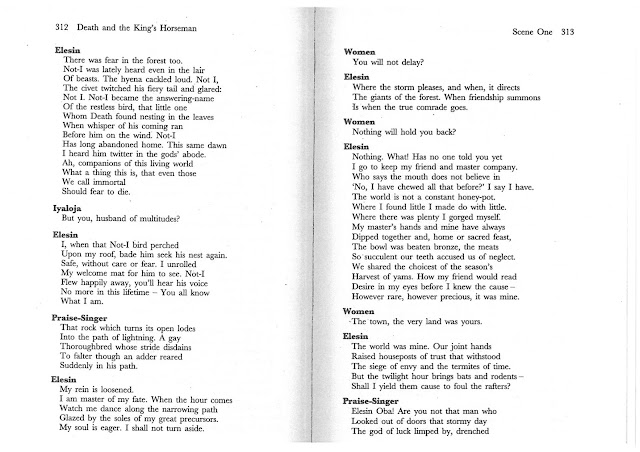Learning targets:
I can analyze the passage and identify two to three details that help with my understanding of the text. (RL.11-12.2)
I can pay attention to the diction (word choice) of the passage and infer their meaning within the context of the monologue (RL.11-12.4)
I can annotate/underline significant parts of the text and reflect on what makes them significant. (RL.11-12.1).
Reminders: Vocabulary quiz on Friday, April 5th. (vocab words are listed below) The matching character will quiz will take place tomorrow (Wednesday) at the start of class, in order to give us more time to work with the Elesin's monologue today.
In class: Elesin's monologue and accompanying handout. This is due at the close of class. (class handout / copy below).
*********************************************************************************
Here is the page that has Elesin's monologue
Name:_______________________ Close reading of Elesin’s monologue
We will be looking at Elesin’s significant monologue during his conversation with the Praise-Singer. The monologue is attached below. We will read through it as a class and then proceed to follow the questions that are on the separate hand out. Each question is a part of the overall close reading process that we will use to understand the meaning behind the passage.
Name: ______________________ Close Reading of Elesin’s Monologue
Directions: Listed below are questions to guide our thinking as we explore Elesin’s memorable speech to the Praise-Singer. We will answer the questions independently and as a class. Each question is to extend our thinking and to help us break down the passage.
1. Underline/highlight the words and sections of the monologue that look familiar to you.
2. Look at what you underlined, what do you think is the significance of the word choice?
______________________________________________________________________________________________________________________________________________________________________________________________________________________________________________________________________________
3. Think, pair, share: Turn to the person next to you and discuss what you underlined/annotated in the passage. Talk about what has occurred in the passage. (You have three minutes to discuss and be prepared to share!)
4. Describe the setting (where is this conversation taking place? (Think about how the stage performance looked)
__________________________________________________________________________________________
__________________________________________________________________________________________
5. What is the tone of the conversation between Elesin and the Praise-Singer? (think about what we know about the plot so far) Reflect on how the diction influences your answer.
______________________________________________________________________________________________________________________________________________________________________________________________________________________________________________________________________________
6. Make general observations on the passage. Think about the characters action, vocabulary words, Yoruba culture, imagery, 5 senses etc. (We will do this portion as a class)
______________________________________________________________________________________________________________________________________________________________________________________________________________________________________________________________________________________________________________________________________________________________________________________________________________________________________________________________________________________________________________________________________________________________________________________________________________________________________________________
7. Given what we discussed as a class, how has the information we learned affect what we think about the passage?
_________________________________________________________________________________________________________________________________________________________________________________________________________________________________________________________________________________________________________________________________________________________________________________________________________________________________________________________________
8. Give 5 predictions for the play based on what we have read and discussed.
_________________________________________________________________________________________________________________________________________________________________________________________________________________________________________________________________________________________________________________________________________________________________________________________________________________________________________________________________________________________________________________________________________________________________________________________________________________________________
********************************************************************************************************
Death And the King’s Horseman VocabularyQuiz on April 5th
1. impudent (adjective): improperly forward or bold
2. bereavement: (noun) state of sorrow over the death or
departure of a loved one
3. ostentatious: (adjective) intended to attract notice and
impress others
4. dearth: (noun) an insufficient quantity or number
5. to usurp: (verb) seize and take control without authority
6. redolent: (adjective) serving to bring to mind
7. to prostrate: (verb) render helpless or defenseless
8. gbedu: (noun) a deep-timbered royal drum
9. opele: (noun) string of beads used in Ifa divination
10.robo: (noun) a delicacy made from crushed melon seeds,
fried in tiny balls
*********************************************************************************
Below is a copy of the whole play and the link to the pdf as well.
https://www.uibk.ac.at/anglistik/staff/davis/death-and-the-king-s-horseman---wole-soyinka.pdf












































No comments:
Post a Comment